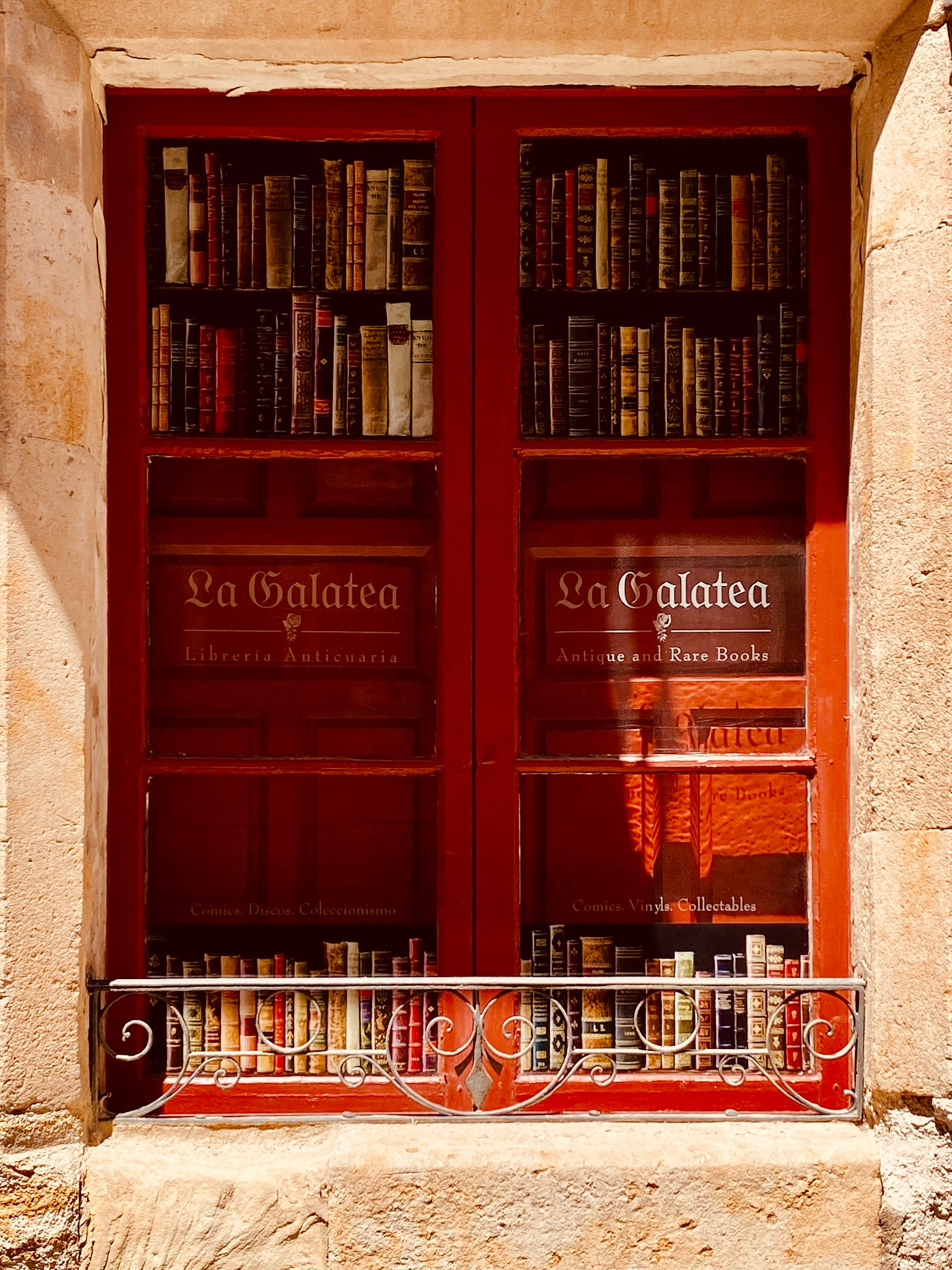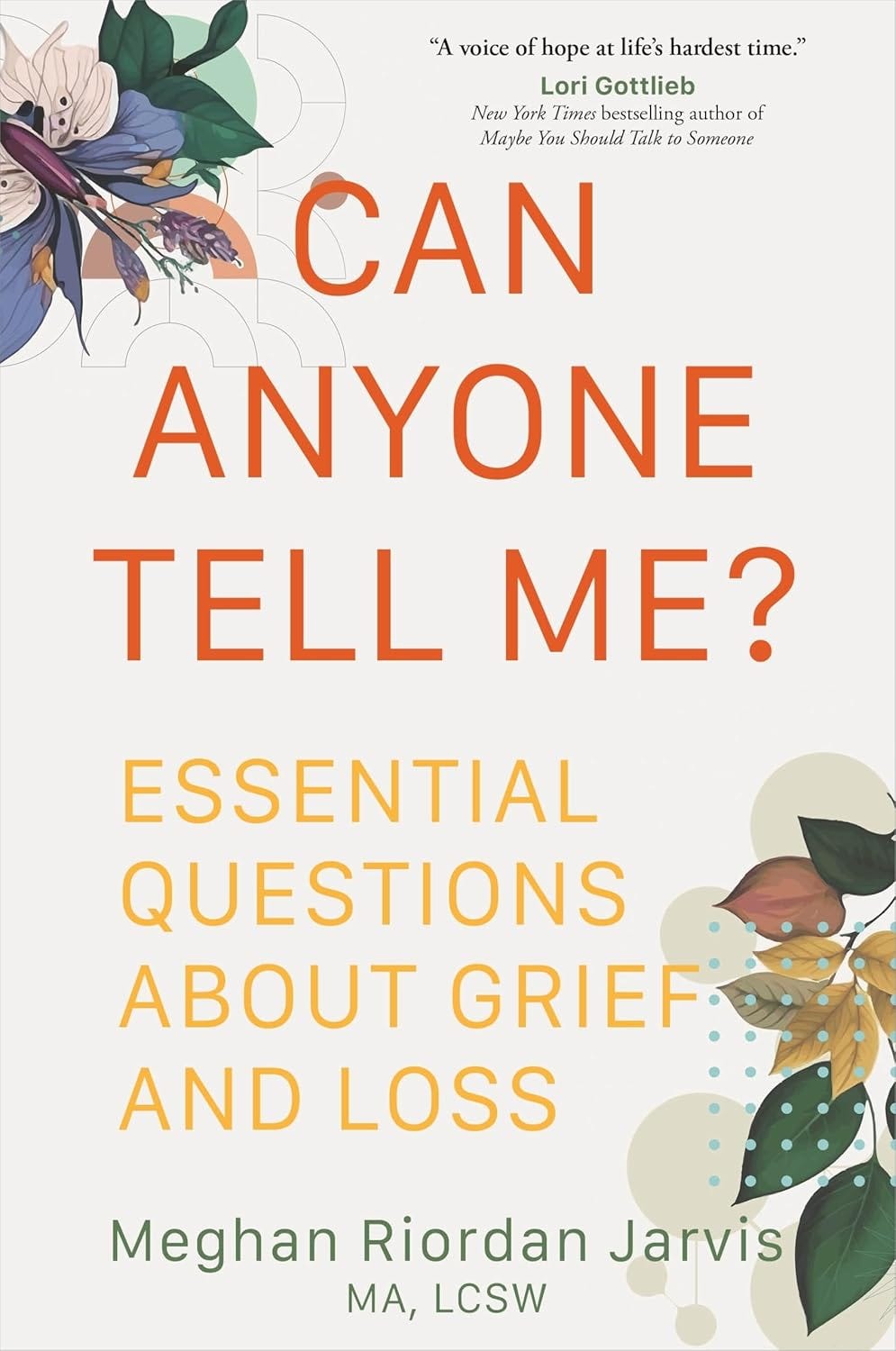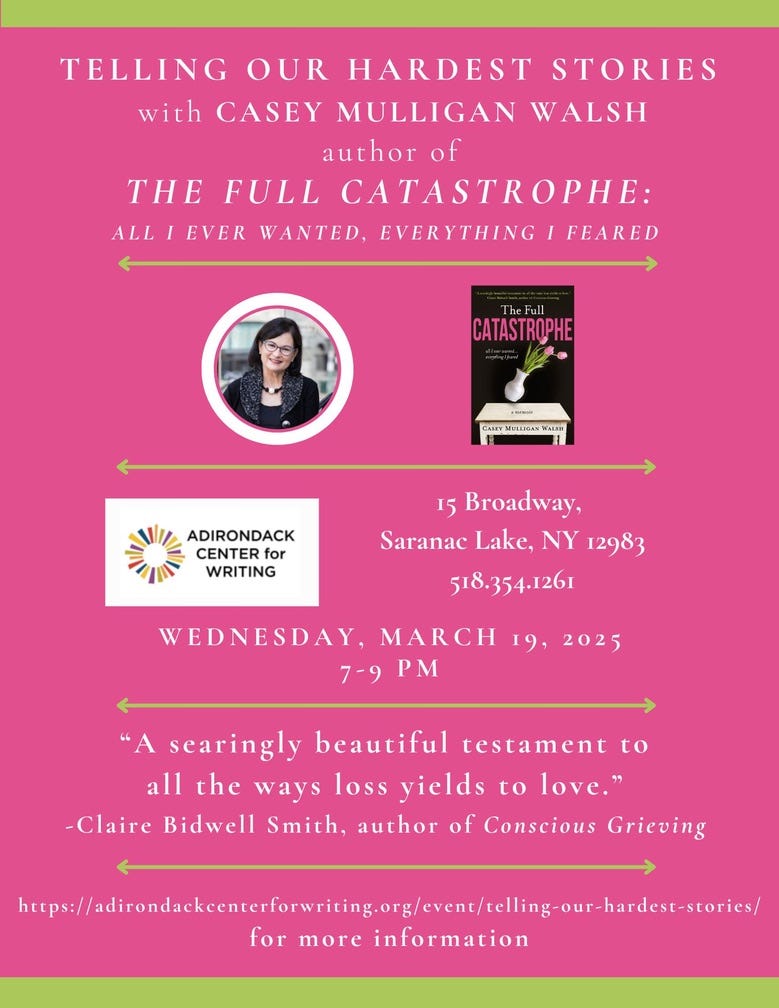What is Anger, Anyway?
The root of anger in grief and beyond. Also: The Full Catastrophe is here, and with it, so many opportunities for real conversations about belonging, uncertainty, grief, and joy.
Salamanca, Spain, July 4, 2022
(a preview of our next trip, elsewhere in Spain, now in the planning stages!)
Welcome to all my recent subscribers. I’m honored to have you here. Many of you have found me through my new memoir, The Full Catastrophe: All I Ever Wanted, Everything I Feared, published by Motina Books in February 2025, or through our new literary magazine, In a Flash. If I haven’t said it enough, I’m beyond grateful for your support.
Before We Begin…
a brief request.
If you’ve read The Full Catastrophe (or plan to), please, please 🙏🏼 leave a brief review on Amazon here. As I’ve mentioned before, these reviews are so important for small press books and get them the recognition they need to be seen by more readers. Even if you haven’t purchased the book at Amazon, you can still review it there. Simply select the star rating and write a few lines.
If you’ve already reviewed it on Goodreads, click “write a review” and your review should appear. Copy and paste that into Amazon and, voila!
Inspiration Everywhere
In the flurry of book launch events—parties and in-conversations, solo book talks, excerpts, podcasts, and interviews—including radio and TV spots (pinch me!)—I’m learning that what I’ve long suspected is true: folks everywhere are hungry for real talk about the ways we struggle through uncertainty and grief, how we sometimes mistake fitting in for true belonging, how we can find new ways to see the world if we’re open to them. How there are good people everywhere, and how we are truly connected in ways far deeper than we’ve imagined.
Case in point: At a book talk this week, one brave soul raised her hand. “I’m so angry,” she said. After experiencing a deep and shocking loss several years earlier, she shared, “I’m worried I’ll just be angry forever.”

Though I’ve experienced many of the losses we all fear most—both parents by the before I reached my teens, my only sibling just after I married, both the relatives who raised me and my mother’s best friend (who was a lifeline during my teens) before I turned 30, then most devastating of all, my oldest son when he was just 20—I haven’t lived through her specific loss, and I don’t pretend to be an expert in grief.
What I am an expert in, however, is my own journey through repeated loss. The same is true for each of us who has experienced loss (and isn’t that nearly everyone, by a certain age?).
No one gets to tell us how to grieve, or that we’re doing it wrong, or how long our journey through grief should take (as if it has an end date at all).
But what we can do, all of us, is reach out a hand and share what has been meaningful for us. Help those deep in the struggle feel less alone.
For me, anger—like jealousy and blame and resentment and any number of other less-than-loving emotions—has its source in fear.
When I share this, I hear a variety of reactions. No, I don’t agree. Hmm, let me think about that. Or the lightbulb moment—maybe there’s some truth to that.
That conversation has stuck with me in the days since the book talk. I turned to one of my favorite new books on grief, Can Anyone Tell Me? by psychotherapist Meghan Riordan Jarvis, who specializes in trauma and grief and loss.
According to the back cover, “This accessible guide provides clinical insights into [many of the ‘whys’ of grief], along with real-world stories, hopeful lessons, and practical steps for navigating loss.” I especially love that this book includes not only advice for grievers but for those who support them, something I’ve found lacking in many other grief books.
You can read my review of Can Anyone Tell Me? here.
Back to my question: Is there more beneath the emotions and feelings (spoiler alert: these are two different things) that spark anger in grief?
As Jarvis tells us, “Richard C. Schwartz’s Internal Family Systems (IFS) model defines anger as one part that may be trying to keep the griever from having to feel something even more vulnerable.” She adds,
“[When I try to guess what’s hiding behind my ‘angry part’], one hundred percent of the time, it is fear…Anger is a reactive emotion. When it shows up, get curious about what it is reacting to.”
Does fear being at the root of so many of our negative feelings…jealousy, anger, even hatred…resonate? Please let me know how this lands for you in the comments. We so rarely talk openly about the more private, difficult parts of grief and loss. Let’s create that safe space here.
News of the Day
Publication of The Full Catastrophe has given me so many beautiful opportunities to talk about its themes.I’ll be sharing these on social media in the coming days and weeks, but I wanted to let you know about them here first. I hope you’ll check them out and then follow the writers and podcasters and reviewers who so generously offered their time and platforms.
Marie A Bailey newsletter—Death is Inevitable But Love Never Dies 12/18/24
Linden Review—Review by Rebekah Hayes 1/31/25
Women Writers Women's Books—Excerpt from The Full Catastrophe 1/31/25
Women Writers Women's Books—Q & A with Morgan Baker 2/8/25
Christina Consolino interview—Connection is Everything 2/17/25
I Don't Know How You Do It Podcast with Jessica Fein—Loss, Love, and Finding Your “F*ck You 2/18/25
Let's Talk Memoir Podcast with Ronit Plank—Putting the Less Than Heroic Parts of Ourselves on the Page 2/18/25
Roundtable with Joe Donahue, WAMC, Albany, NY, NPR Affiliate—Casey Mulligan Walsh provides a moving testament to the power of love in "The Full Catastrophe: All I Ever Wanted, Everything I Feared" 2/20/25
Writing Your Resilience Podcast with Lisa Cooper Ellison—Casey Mulligan Walsh on Writing About Loss and Finding Belonging 2/20/25
WNYT Channel 13 with Tamara Starr—Local Author Casey Walsh Raises Awareness for Heart Health and Genetic Disorders 2/25/25
Chicago Review of Books—The Full Catastrophe: Discovering Love in a Life of Loss by Sarah Leibov 2/28/25
Good Grief With Cheryl—The Full Catastrophe 3/6/25
Five Years a Writer —Review of The Full Catastrophe by Amanda Le Rougetel 3/8/25
Between Grief and Joy with Yolande Clark-Jackson—Substack Live with Casey, author of The Full Catastrophe 3/8/25
Hippocampus Magazine—Review by Melissa Greenwood 3/10/25
Jane Ratcliffe’s Beyond—Lullaby and Goodnight reprint 3/13/25
Also, these events are on the docket this week, and more in the months to come:
That’s all for now. Thank you so much, each of you, for reading this far, for sharing, and for joining this growing community of folks who believe in the importance of holding each other up through all life throws our way. As the sticker on my car’s rear window proclaims, “You Matter.”
If your LDL-C cholesterol is over 190, doesn’t change with lifestyle modifications, and you have a family history of early heart events, you could have FH. And ask your physician to test your Lp(a) (say it: “L-P-little a”), since it’s elevated in 1 in 5 individuals yet is hardly ever checked. Feel free to get in touch—
In a Flash opens for submissions on the theme of LIGHT from April 1 - 15. If you’re a flash CNF writer, we’d love to see your work in our queue.
Remember: so many emotions and feelings arise around grief and loss and trauma and uncertainty. Be gentle with yourself and stay open to the possibility that you may have only scratched the surface of their source. We are nothing if not complex, multi-layered creatures. And while you’re at it, be kind to yourself. All grief is valid. Yours, too.
Till next time,










Thanks, Casey!
PS: Would you please remind me about the quote (6 words long) about love and fear?
So many great book events for your memoir!! ❤️